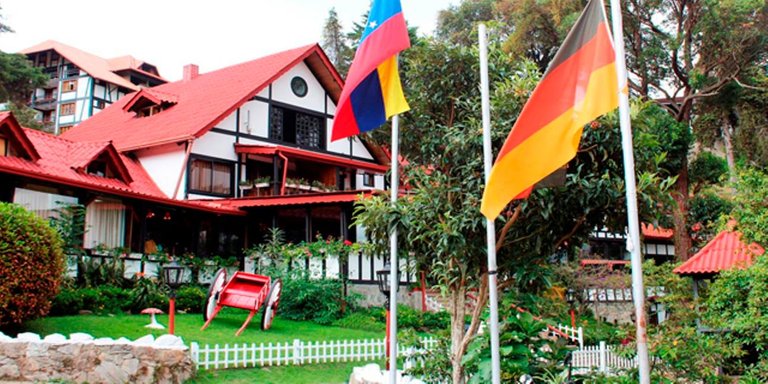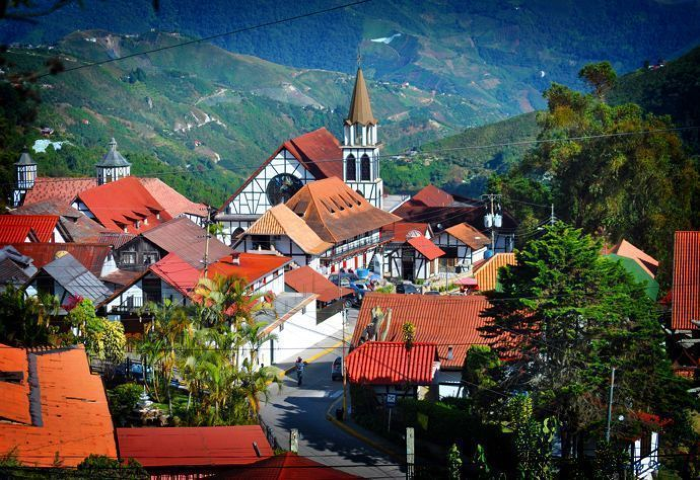It was spring in the Kaisertuhl (Emperor's chair) mountains specifically in the city of Edingen, a mountainous wine-producing area of the former Grand Duchy of Baden on the banks of the River Rhine, It was an independent state until it joined the German empire in 1871, its cool and pleasant climate, its fertile soil, its hospitable, generous and hard-working people, as well as the smell of freshly baked bread, sweets and roast meats, mixed in its streets. Its market exhibited its rich delicacies, handicrafts made of wood, iron and glass, all this made that city and its people a very cozy place.
Time passed without any news that could change the pleasant daily life. Time passed quickly until December, many families in the city made their preparations to celebrate Christmas and the New Year, everything was joy, there was an atmosphere of celebration and sharing that enveloped its inhabitants, however it was done a pause in that atmosphere of joy, all due to the arrival of a group of foreigners, it was a mission that was arriving in that city, which had nothing to do with Christmas.
The eyes of many locals did not leave the foreigners, some of them denoted surprise, sadness and others anxiety. These men were Agustín Codazzi (renowned engineer), Ramón Díaz and Martín Tovar ponte (count Tovar) who the previous year were in those mountains, as emissaries of the president of a South American country and at the suggestion of Alexander von Humboldt (geographer, astronomer, humanist , naturalist and German explorer) with the task of hiring personnel (settlers) to found new populations in which agriculture and mining would develop, prior to this meeting the area where the Colonia Tovar would be installed had been selected, taking into account the Geographical and climatic similarities of the kaiserstuhl, the lands were 2,200 meters above sea level which made it ideal for European settlers, located in the coastal mountain range, donated by Manuel Felipe Tovar, Count Tovar's nephew, it was baptized place as "Palmar del Tuy" on October 14, 1841.
The day after their arrival in the city, they selected the settlers who would travel to South America, they were in total: 389 people, 239 men and 150 women, that same night they met at the inn "Der Pfauen" contracts were signed between the Representatives of the South American Country and the settlers, in that unusual meeting, the inn was full of relatives and friends of those brave immigrants, who would soon leave their loved ones, their houses, their goods, as well as the city where they were born, their country , in short, everything to go off into the unknown.
In that room there was a mixture of feelings, cries, sighs, hugs, thoughts in their minds, in which his fears told her that they would never see each other again.
The next day very early in the morning on December 18, 1842, they boarded the Havre ship, with a few things in their hands, tears in their eyes and their broken voice, they said goodbye to their relatives to whom many of them would be The last time they were seen, they sailed that day on the River Rhine, until they reached the port of Le Havre (France), it was not until January 19, 1843, that they set sail for South America aboard the French ship Clemence, during the many of them had the opportunity to get to know each other better, to establish a good friendship, which would help them to be stronger in their new community.
It was not until March 4 of that same year (1843) that they arrived at the port of La Guaira, however they could not disembark because there was an outbreak of smallpox on board, so they had to remain in quarantine in Choroní, on 31 March 1843, the European immigrants embarked and at last they were going to what was to be their second home, there were many many expectations in them, perhaps they were wondering: will the land be good? How would the treatment of the people of this country be? Will we make progress? In short, all those questions and unknowns were yet to be answered, they went to the city of Maracay and later to the city of Victoria where they were received by the then president Carlos Sublette, the settlers arrived at Palmar del tuy, today Colonia Tovar on the 8th of April 1843, 112 days after leaving his hometown (Endingen) that day is considered the founding day of the Tovar colony.
In particular, he thought, like many people, that this group of brave colonists was only made up of farmers, artisans and adventurers, how far it was from reality, there came scientists, naturalists, writers, and painters such as: Karl Ferdinand Appun, Karl Hermánn Karsten , Karl Moritz, Nicholas Funkc, Anton Georinng, Wilhelm Sievers, Augustus Augustus Fenler, and Ferdinand Ballerman. For this reason the Tovar colony became one of the most influential political centers of German immigration in Latin America, as the colonists prospered, apart from being producers of excellent coffee, the production spread to other lands with the cultivation of legumes, vegetables and fruits, which have a good market nationwide.
It was declared in 1960 as an area of tourist interest, it is considered one of the richest municipalities in the country and with a better quality of life, its descendants are integrated into the country and have mixed with the native population, they have improved their knowledge of German Due to the arrival of German tourists, who have been surprised to find a typical German town in the middle of the tropical zone, the courage and detachment of those 389 settlers is extraordinary, resulting in a prosperous and beautiful German town in the lands of South America, such as example to follow and understand that in times of crisis great things can be done, as these entrepreneurs of the past did. When reading this article aloud with the intention that a family member who was nearby would listen and give me their opinion on it, I felt my voice break as I read each line of this extraordinary story, because I feel in some way affinity with it, since I have relatives abroad, including my beloved children, whom I have not seen for several years, for reasons beyond our common desire to meet again (expired documents, requirement of neighboring countries for visas, economic solvency , pandemic) in short there are many ...... But like the perseverance of those settlers, we have the firm faith and hope that we will soon be together.


great history
I agree, most of them may never live to see them return and some might be lucky enough to.
Wow, this is interesting. I can imagine how much the city-states prospered in agriculture and food
I understand what you mean dear. We have also had people who had to travel far distances as a result of one thing or the other. And we are left with memories of them alone
But I am glad that you have so much faith in seeing them again
If, although for now it looks a bit difficult due to the situation in which it is going through, the last thing I lose is the hope of seeing that splendor again, thanks for commenting!
The story had been full of ups and downs but still the Germans didn't give up they had hope of better things ahead which really teaches a moral.
Yeah!! Definitely you would get to meet those loved ones of yours someday, just keep believing though it's hard to know that our loved ones are far away and outta reach but as long as we got a conviction that one day we would meet them again I really don't see a reason to worry or make a fuss.